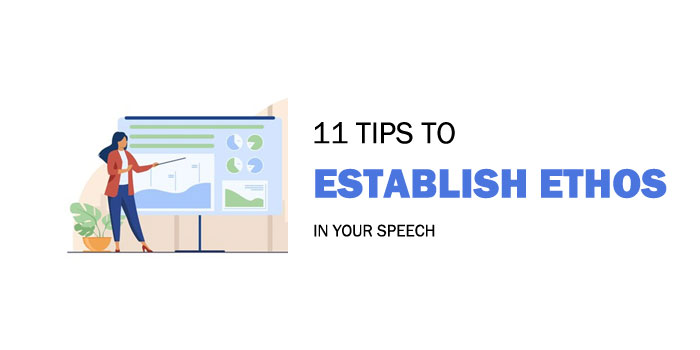11 Tips to Establish Ethos in a Speech
Do you fear not being able to persuade your audience? If your audience must listen, understand, and believe you, you should know how to establish ethos in a speech.
There is no rocket science in it - you just have to ask yourself a few questions. What can you do to make a good impression on your audience? How can you represent yourself as a credible source of information?
Try out the 11 highlighted practical tips that can help you improve your ethos.
What Does Ethos Mean?
We can define ethos as the emotions or behavior of a speaker displayed to persuade or convince an audience.
On the other hand, pathos means the emotion that a speaker hopes to show the audience.
How Logos and Pathos Influence Ethos
You must learn to balance ethos with logos and pathos if you wish to present a persuasive speech.
Pathos
Pathos deals with a speaker's emotional resonance, and it helps you relate more with your audience through emotional language.
Logos
Unlike pathos, logos work more effectively because of its logical credibility. You offer your audience relevant information or knowledge that helps them understand you better with logical evidence.
Different Elements of Ethos
According to Aristotle, every speaker must have three components in their speech to establish ethos. The absence of any of these components weakens the credibility of the speech.
Phronesis
We can define phronesis as the speaker's intelligence or wisdom. It establishes your ability and aptitude to keep your audience engaged in your discussion.
Phronesis helps you show that you have persuasively in-depth knowledge of your topic.
Arete
What is the charity or moral virtue of your discussion?
Arete helps you answer this question by highlighting the morality of your discussion or argument to your audience. You must not assume that your audience understands or agrees with you and, thus, justify your point of view.
Eunoia
You should learn how to establish goodwill, trust, and rapport with your audience.
Eunoia ensures that you discuss the background of your speech and make the conversation more engaging.
Aspects of Ethos
You can measure a speaker's ethos with respect to four primary aspects.
Trustworthiness: How do you prove that you are telling the truth to your audience?
Authority: What type of authority do you have with your audience, formal or informal?
Reputation: Do you have the expertise on the topic you want to discuss with your audience?
Similarity: How can your audience relate to you?
Let's be clear; ethos defines the audience's perception of your personality. As a result, many people may use your past speeches to form their perceptions.
To learn how to improve ethos, you need to understand the four aspects in detail.
#1 Trustworthiness: You Should Learn to Be a Good Person
We all like to deal with and stay connected with good people. So, you should think positively, become a good person, and do great things. This means that the positive things you do gradually rub off on others.
With time, this will help you improve your ethos and influence your target audience.
For instance: Did Tiger Woods lose his trustworthiness during his infidelity scandal?
#2 Authority: You Should Build a Deep Knowledge Bank Around Your Topics
You can stand out among other speakers if you have credible knowledge in your area of discussion.
Today, people have become busier and would not want to waste time listening to someone without adequate knowledge of the topic.
Hence, ask yourself - why should people listen to your conversations? What will make you appealing to your audience when you speak? People stick to speakers who have experience in their fields.
#3 Reputation: You Should Market Yourself
You may speak to an empty room if you don't market yourself. People are likely to listen to you when they know who you are and what you have for them.
Therefore, develop yourself and find the most relevant niche for your craft.
#4 Similarity: You Must Analyze Your Audience
Improving your ethos requires a thorough understanding of the addressee. When you analyze a target audience, you find valuable clues, common traits, preferences, and other facts about them.
With these discoveries, you can adapt to their lifestyles in terms of dressing, body language, stories, and mannerisms.
How to Improve Ethos in a Speech
1. Show Up Early (Trustworthiness)
You must show dedication to your work by arriving early to an engagement. Some actions speak louder than words, and respecting people's time is one of them.
When you are punctual, the audience learns to trust you more, improving your ethos.
2. Talk About Your Experience (Similarity)
Sharing your experience about the event, especially when you come early, gives your audience a sense of belonging.
Moreover, it can help you understand your audience and give you some ideas of what to share with them during your speech.
3. Display Ethos in Your Marketing (All)
If you have an opportunity to market yourself, don't waste it. You can complete your topic with your bio. Try to clarify why they should listen to you with evidence or facts.
Some people may not use the topic alone to make their decisions. Therefore, find better ways to keep them coming back to your sessions.
4. Showcase Ethos During Introduction (All)
The first place to highlight ethos in a speech is during your introduction. For this reason, ensure that you have a good introduction and you don't just wing it. It would help if you established your reputation, similarity, authority, and trustworthiness with essential facts,
However, you must not overdo the introduction because you can bore your audience with a long speech. Don't bring up many past clichés that can make you feel pompous.
For instance, if you're talking to some employees about a new product, you can mention their work environment, job responsibilities, expectations, etc., which helps them resonate with you.
When you establish ethos during your introduction, you should continue improving your ethos until you conclude your speech.
5. Use Anecdotes or Stories to Provide Consistency (Trustworthiness)
Your audience will not believe you if they feel like you don't follow your own words.
For instance, if you are advising people to avoid using plastic, you must share some personal stories where you have done the same.
6. Speak in a Familiar Language (Similarity)
You need to speak to your audience in a familiar language for the following reasons:
It can help them understand you better and allows you to become more persuasive.
- The audience relates more with you, which helps you improve your ethos.
- Learn to use familiar terms that everyone can understand when highlighting some concepts.

For instance, when you talk to medical personnel, you should not use jargon from real estate.
Likewise, you should also pay attention to acronyms. Using wrong or bizarre acronyms would create a bad impact on the audience.
7. Use Common Examples (Similarity)
You can use different anecdotes, stories, or visuals to which your audience can relate when you address them. Ensure that you pick the most impactful examples to help your audience understand what you want to explain.
For example, when speaking to students, you can use social media memes to highlight your points. It will click them immediately, and they will likely pay more attention to you.
Yet, doing the same with middle-aged people would not be a good idea. In fact, they may find you less serious and unprofessional.
8. Select Statistics and Quotations From Credible Sources (All)
Adding statistics and quotations makes your speech more persuasive. However, you must only use the ones that come from credible sources. While these tools improve your ethos, you can be called out if you make mistakes with them.

For example, if you want to talk about cancer research, you can share statistics from the American Association for Cancer Research. People are more likely to believe the data from AACR than a random author.
9. Learn to Reference Events or the Audience (Similarity)
Having a shared experience with your audience helps them realize that you are one of them. A good way to do that is by engaging with them during the event. The audience feels better and willing to learn from you when you share similar experiences with them.
Likewise, revisit things people might have said earlier in the session and use them to encourage others to share their thoughts. This will engage your audience, enabling them to connect with you better.
10. Stay Around After Your Engagement (Similarity)
You should not run off after your session. Instead, stick around and mingle with the audience before you leave. Some people may want to ask private questions and share contact details with you.
You may have opportunities to improve your ethos when you give them some extra time in the end. Since the audience finds you accessible, they can relate better with you.
11. Follow Through on Promises (Trustworthiness)
Question and answer sessions can be tricky. You must learn to defer complex or challenging questions that can take your time. Politely request to explain better after the engagement or drop your contact details for the person to reach out later.
You don't want to spend 20 minutes answering a single question when you have ten minutes to conclude the sessions. You can follow up after your engagement for such inquiries.
Furthermore, follow through on promises you made during this session. You should return to the thorny questions you promised to revisit with the right channel.
Ethos Short Term vs. Long Term
If you noticed, we talked more about similarity and trustworthiness than reputation or authority. To establish your ethos in a speech, you should understand some principles.
- You can influence your audience if you focus more on similarity and trustworthiness. People may have different conceptions about you, but with these two factors, their perspectives might change.
- The preconceptions about you begin even before you start speaking. As a result, it can be challenging to prove your reputation and authority on a subject during an on-the-spot assessment.
- You should mention specific experiences related to the topic along with authentic information from credible sources.
- Use a familiar tone that can help you relate with your audience.
- Ensure you offer a balance between logos and pathos.
- Stay away from logical fallacies.
Conclusion: Establishing Ethos in Public Speaking
You must build your credentials if you wish to influence your audience. Hence, to establish ethos in a speech, understand who you are addressing. Lastly, providing your authority on a specific topic will make it easier to gain your audience's attention.
All in all, you cannot build a rapport if you don't know how to use ethos. Successful speakers know how to intertwine ethos, logos, and pathos in their speeches. If you wish to be one of them, start working on these three elements.
